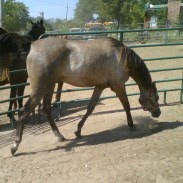
I've found from various reads and chit chats that "training" is a very broad and often misused term. For starters, what does a "thirty day start" actually mean? I'd like to think the trainer took your horse and made friends, then slowly built up to haltering and the like. Quite the opposite. It seems that "training" or "trainer" should be labeled "constrain" or "tyrant." Don't go OFF on me, obviously there are people out there that understand horses should be taught not trained, but they're few and far between. Maybe the "trainers" see the income potential in forcing a horse to do things in a certain amount of time and that's how money exchanges hands fastest. Shame shame.
Horses obviously don't respond to a pushover. You've got to be a confident, firm, calm leader. Commanding your horse by fear only goes so far. For example: you're out on the trail and the horse spooks. One of two things happens 1)The horse freaks and takes off with you on top or 2)The horse draws strength from its partner-the one on top.
I think the main people-horse relationship problem is time. People are just not willing to devote time to develop a foundation, then wonder why horsey acts up at the most inopportune moments. Compare a child to your horse. When a child acts up or just doesn't understand what you want - is it appropriate to BEAT them with a whip, kick them, tie them to a post? Of course not. So why is it okay for such a gentle loving creature to endure these hardships? I may not know all the fancy lingo, I may not know how to train dressage: But this much I know - At the end of the day I have a horse who does his absolute best for me, who does whatever I ask, and is willing to try anything. For me. That's my partner, Wynchester DB.
Horses obviously don't respond to a pushover. You've got to be a confident, firm, calm leader. Commanding your horse by fear only goes so far. For example: you're out on the trail and the horse spooks. One of two things happens 1)The horse freaks and takes off with you on top or 2)The horse draws strength from its partner-the one on top.
I think the main people-horse relationship problem is time. People are just not willing to devote time to develop a foundation, then wonder why horsey acts up at the most inopportune moments. Compare a child to your horse. When a child acts up or just doesn't understand what you want - is it appropriate to BEAT them with a whip, kick them, tie them to a post? Of course not. So why is it okay for such a gentle loving creature to endure these hardships? I may not know all the fancy lingo, I may not know how to train dressage: But this much I know - At the end of the day I have a horse who does his absolute best for me, who does whatever I ask, and is willing to try anything. For me. That's my partner, Wynchester DB.
Now I've posted my own opinion: Now I have found at least someone who agrees with me-or perhaps I agree with them...
"Legitimate training involves acceptable methods and mechanisms that gradually influence and modify a horse's behaviour to the extent that it receives positive rather than negative reinforcement....We have learned through the countless books, videos and clinicians, that there is gentler and kinder ways to condition your horse. The old excuse - my granddad did it that way - no longer holds water...If we were to subscribe to that philosophy where it came to the way we treat people, we would still be bleeding sick people out in order to rid them of most illness. " -Kimball Lewis












No comments:
Post a Comment